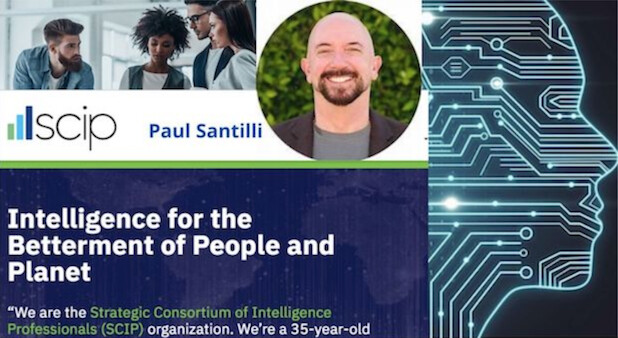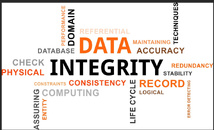Veille Magazine is pleased to collaborate with SCIP (Strategic Consortium of Intelligence Professionals) to bring forward crucial discussions on data integrity, competitive intelligence, and truth in the digital era. As a leading figure in this field, Paul Santilli, CEO of SCIP, brings extensive expertise in business intelligence, strategy development, and ethical data practices.With a distinguished career in competitive intelligence and strategic innovation, Santilli has been at the forefront of promoting responsible data-driven decision-making. His insights on the role of AI, data biases, and misinformation are particularly relevant in today's fast-changing information landscape.As part of this collaboration, Veille Magazine present an exclusive interview with Paul Santilli, discussing the challenges of data truth, the implications for businesses, and strategies to ensure responsible intelligence practices.
Veille Magazine: We live in a world where the volume of data generated and shared has never been greater. In your opinion, how does data shape our perception of truth?

Paul Santilli: Data has become a fundamental component of our understanding of the world. It serves as a powerful tool to validate facts, particularly in science, journalism, and governance. However, it can also be manipulated, biased, and misinterpreted. The explosion of big data, combined with artificial intelligence algorithms, has transformed our relationship with truth, sometimes even fragmenting reality into multiple subjective perceptions.
VM: You mention AI algorithms. How do they influence the way we access and interpret information?
P.S.: Today, our online behavior shapes the information we receive. Algorithms adapt to our preferences and reinforce our beliefs by pushing similar content—a phenomenon known as confirmation bias. This limits exposure to diverse perspectives and reduces intellectual diversity.
Moreover, AI can generate misleading or entirely fabricated content, such as deepfakes or automated disinformation. Without vigilance, we risk trusting information that appears credible but is actually manipulated.
Moreover, AI can generate misleading or entirely fabricated content, such as deepfakes or automated disinformation. Without vigilance, we risk trusting information that appears credible but is actually manipulated.
VM: What are the main challenges related to the use of data in competitive and strategic intelligence?
P.S.: In Competitive Intelligence (CI), the quality and integrity of data are paramount. However, several challenges arise:
- Selection bias: If data is not representative of an entire market or sector, it can distort analyses and lead to incorrect strategic decisions.
- Data manipulation: Some information may be intentionally skewed to serve specific interests.
- Contextual ambiguity: Raw data, without proper context, can be misinterpreted, leading to flawed conclusions.
- Algorithmic bias: AI models are trained on datasets that may contain inherent biases. If left uncorrected, these biases are amplified and impact automated decision-making.
VM: Given these challenges, how can we ensure data integrity and responsible usage?
P.S.: There are several strategies to guarantee responsible data management:
- Transparency: Clearly documenting sources and methodologies to provide a better understanding of data limitations and implications.
- Education and critical thinking: Training professionals and the public to analyze data critically and recognize biases.
- Regulation and ethics: Establishing legal frameworks and standards to govern data use.
- Independent fact-checking: Strengthening mechanisms to verify claims and combat misinformation.
VM: In conclusion, how do you see the future of data and truth in the digital age?
P.S.: Information will always be a critical issue for businesses, governments, and society as a whole. As technology continues to evolve, we must remain vigilant against potential abuses. The future will depend on our ability to establish ethical practices, promote source diversity, and educate people about information mechanisms. AI and data should serve the truth, not manipulate it.
Comment by Paul Santilli
Never before in history have we, as a society, been confronted with the level of information and data at our disposal. The speed and complexity of global interactions can impact and determine the rise and fall of large organizations overnight.
Only by harnessing the intelligence power of this tidal wave of data will we be able to overcome global complexities and be able not only to understand, but also to use these global fluctuations as engines of growth within their environment.
About Paul Santilli
Paul Santilli is a recognized expert in the field of strategic and competitive intelligence. He spent 24 years at Hewlett Packard Enterprise (HPE), where he led the global industrial and strategic intelligence organization for the OEM solutions sector. Prior to that, he spent 10 years at Apple in leadership roles related to product development, IT infrastructure, and quality management. SCIP...](https://www.veillemag.com/Interview-with-Paul-Santilli-Director-general-CEO-of-SCIP-President-emerite-of-the-consulting-board-of-SCIP_a4954.html).
He is also Chairman Emeritus of the Advisory Board of SCIP (Strategic and Competitive Intelligence Professionals) and was elected Chairman of the Board in 2019. Paul Santilli is a prolific speaker and author, having published numerous articles on competitive intelligence, innovation, and strategy at SCIP...](https://www.veillemag.com/Entretien-avec-Paul-Santilli-Directeur-general-CEO-de-SCIP-President-emerite-du-conseil-consultatif-de-SCIP_a4954.html)

 Accueil
Accueil

